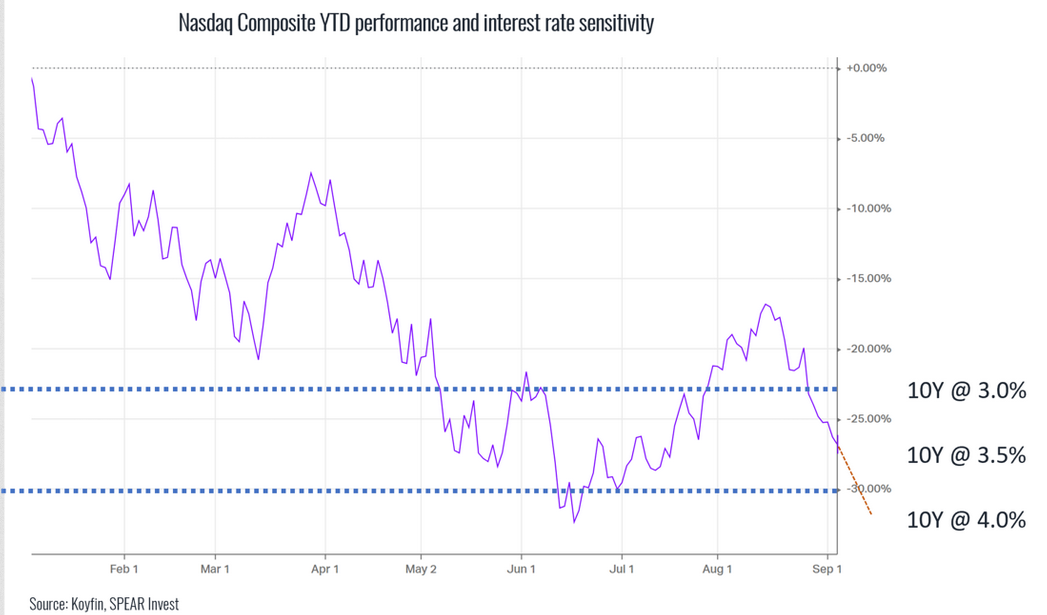Is the tech sector cyclical or secular? We believe it is both. While technology adoption is clearly a secular trend (a fundamental change in a business model), there are many cyclical trends that impact valuations in the tech sector which vary significantly from company to company. Two major contributors are earnings and interest rates.
1. Earnings
Earnings cyclicality is a function of business model and business maturity level. Companies that provide hardware, such as semiconductors face significant cyclicality in earnings as inventory management exacerbates weak demand.
Conversely, software offers solid subscriptions which provide steady earnings. However, depending on business maturity levels, there may be slower growth levels or elongated sales cycles. Similarly, themes and ideas which are in the early adoption stage, such as cloud infrastructure, are less dependent on the economy so their earnings are less cyclical when compared to mature business models such as CRM, e-commerce, and gaming.
2. Interest rates
The risk-free rate is a key valuation metric for all stocks, so the U.S. Federal Reserve's stance on interest rate has driven a lot of volatility in the market, particularly in technology stocks as their valuation is dependent on future profit forecasts.
We estimate that a 1% move in interest rates results in ~15-20% downside in the sector. However, it is important to note that with the 10-year yield between 3% and 3.5%, the current Fed stance on interest rates has largely been priced into stock valuations so tech stocks have been forming valuation floors. We believe that any downside from here will be largely driven by earnings.

Therefore, it is unsurprising that there seem to be more earnings downside surprises in the cyclical area of industrial tech, such as semiconductors, and strong earnings in the more secular areas, such as cloud infrastructure.
Cyclical semiconductor stocks
NVIDIA (NASDAQ:NVDA) and Marvell (NASDAQ:MRVL) both noted supply chain challenges and earnings downside was exacerbated by inventory.
NVIDIA provided weak Q3 guidance with revenues expected to be down 17% year-on-year (yoy) and 12% quarter-on-quarter (qoq). This was 15% below consensus and was driven mainly by the gaming segment. Enterprise spending remained strong, but investors are now worried that this will be the next area of disappointment.
Secular cloud infrastructure
Snowflake (NYSE:SNOW) reported very strong results, including 83% revenue growth. It guided to 67-68% revenue growth in fiscal 2023.
Customers that were underspending in the prior quarter are now outpacing expectations, demonstrating how non-discretionary enterprise spending is. EMEA was strong despite the fact that Europe is in a recession, highlighting the secular component of Snowflake's business.
For more research and primers, visit our website.
Disclaimer: Views expressed here are for informational purposes only and are not investment recommendations. SPEAR may, but does not necessarily have investments in the companies mentioned. For a list of holdings click here. All content is original and has been researched and produced by SPEAR unless otherwise stated. No part of SPEAR’s original content may be reproduced in any form, without the permission and attribution to SPEAR. The content is for informational and educational purposes only and should not be construed as investment advice or an offer or solicitation in respect to any products or services for any persons who are prohibited from receiving such information under the laws applicable to their place of citizenship, domicile or residence. Certain of the statements contained on this website may be statements of future expectations and other forward-looking statements that are based on SPEAR's current views and assumptions, and involve known and unknown risks and uncertainties that could cause actual results, performance or events to differ materially from those expressed or implied in such statements. All content is subject to change without notice.
All statements made regarding companies or securities or other financial information on this site or any sites relating to SPEAR are strictly beliefs and points of view held by SPEAR or the third party making such statement and are not endorsements by SPEAR of any company or security or recommendations by SPEAR to buy, sell or hold any security. The content presented does not constitute investment advice, should not be used as the basis for any investment decision, and does not purport to provide any legal, tax or accounting advice. Please remember that there are inherent risks involved with investing in the markets, and your investments may be worth more or less than your initial investment upon redemption. There is no guarantee that SPEAR's objectives will be achieved.
Further, there is no assurance that any strategies, methods, sectors, or any investment programs herein were or will prove to be profitable, or that any investment recommendations or decisions we make in the future will be profitable for any investor or client. Professional money management is not suitable for all investors. Click here for our Privacy Policy.
